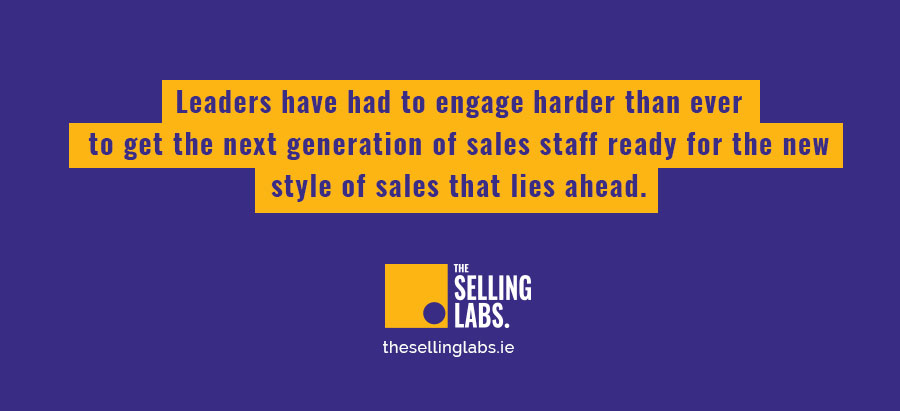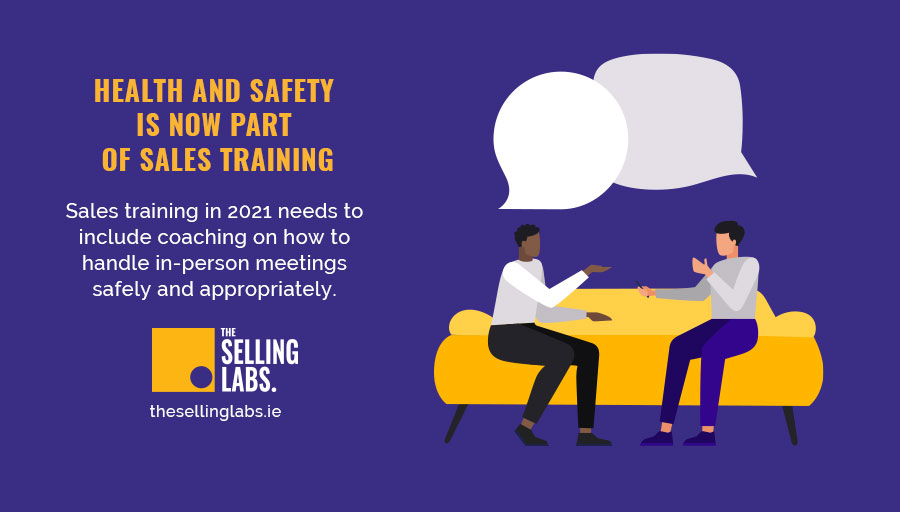Sales Training May Never Be The Same Again
As the global pandemic enters a new (and, we hope, final) phase, our businesses continue to adjust. With the myriad of ways the virus has affected our lives and businesses, things may never be the same again. As companies continue to strategise they pay particular attention to people strategy and talent management.
With that in mind, this article looks specifically at sales training and how companies have been forced to adapt. We also look at how things may evolve as we emerge from lockdown.
Sales Training in a Post COVID-19 World
It’s hard to overstate the impact of COVID-19 on sales training. Leaders have had to engage harder than ever to get the next generation of sales staff ready for the new style of sales that lies ahead. We look at some of the effects this had had.

1. Virtual Sales Training Became The Norm
As companies looked for ways to continue to offer sales training in the early stages of COVID, it became obvious that virtual meetings were the only way they could continue to operate. In the early days, Zoom dominated the marketplace. “Zoom” even became the go-to brand name for describing virtual work meetings.
As video usage scaled, Zoom and similar video conference providers included features to assist in virtual training. As well as the handy break out rooms that enabled interactive brainstorming groups, participant interaction was enabled in a deeper way with the raising of the virtual “hand” to interject and contribute, while white boards and commenting became the norm. This helped online training be more interactive and fun.
Companies created specific training programs or adapted old ones to be delivered online. Here at The Selling Labs, we kept groups small and we tailored our sales consultancy for SMBs to ensure relevance and engagement.
2. Buyers’ Priorities Changed
Most industries saw significant dips in demand and production while staff acclimatised to working from home, remote from their clients. While they dealt with the inevitable nervousness about the pandemic, they learnt to cope with the ‘new normal’. Sales teams had a challenging year – targets were missed, bonuses lost, jobs cut. Confusion around government strategy created a fear of the future and the sudden remote nature of working paused hiring and investment in personal development and training.
Prospects in the sales funnel were a long way from closing. And because of this, training had to adapt with an increased focus on servicing existing customer bases and building strong customer relations. The priority was to maintain a steady state.
Now sales reps have a choice. They can apply a ‘soft-touch strategy’ where staff project a low-pressure focus on new business. Or they can act smart, take a step back, assess the wider sales strategy and adjust respectively (and learn how to close a deal).
Sales training works well in conjunction with this re-set. Getting back to basics and focusing on core business is a smart way to use downtime, supplementing the reflection time with focus groups to brainstorm innovation and reinvigoration. Encouraging ideation from the most junior sales rep upwards encourages fresh thinking from the teams at the coal face – those who have the insights and knowledge from proximity to the industry.

3. Training in Digital Channels Is the Future
It’s not only sales training that has had to shift to virtual delivery, so it is for all go-to-market activity. Salespeople need to feel as comfortable and equipped to handle the sales process online as they did in person, and sales training can help with the tricky elements like closing and handling objections. Training techniques like roleplay and group coaching, which have migrated easily to video, can demonstrate how effectively executives can communicate whether it be in person or virtually.
4. Health and Safety Is Now Part of Sales Training
Even when we are back in the field with face to face selling, there may be nervousness and cautiousness as the markets adjust after a year of working and selling from home. Sales training in 2021 needs to include coaching on how to handle in-person meetings safely and appropriately. While everybody knows how to wash their hands, studies show that even this is a skill that people have let it slip over time!
5. Reducing Virtual Conference Fatigue
Sales staff have personalities that adapt well to change and to deal with complexity. But “Zoom fatigue” has set in! To help prevent this, companies have changed the way they hold training modules to engage people more effectively. The hope is that this will encourage people to pay attention and be present. Best practice is to personalise content and make sessions entertaining and interactive rather than the more traditional lecture-style of delivery.
Other suggestions are to look closer at delivery style to include more active participation, to introduce a more coaching style of delivery.
Modules use roleplay and questioning techniques: Coaches and Trainers ask questions rather than give answers , get participants to engage in group activities, and use roleplay to lock the learning. This helps people engage in a meaningful way that requires attention rather than allowing delegates to get distracted.
6. Encourage Active Listening More Than Ever Before
When engaging online, there are many distractions, as we have come to discover. Families in the background, multi devices in front of us and the postman at the door! As a result there has been a rapid growth in the demand for training modules that focus on active listening and maintaining a strong presence. Improvement in these areas can dramatically improve the effectiveness and memorability of a sales person. Encourage attentive listening, with curiosity, and listening with eyes as well as ears, looking for body language and other triggers. Individuals are coached on maintaining a strong presence, communicating clearly and with conviction and being polished in delivery. Participants are being encouraged to handle conflict objectively and not to dominate conversations.
Finally, trainers encourage how to respond to others’ ideas and to use open ended questions as a conversation tool. This assures clients that the sales person cares about what is being discussed.

How Has Sales Training Changed?
It’s been a year unlike any other and sales training consultants have had to adapt in 2021 to continue to be relevant. Sales training strategies are essential to continue to invest in the next generation of salespeople. If you continue to have questions, or are considering investing in sales training, get in touch and have a chat with our dedicated teams. They will be happy to help.
On Expert Sales Tips
Get regular updates delivered straight to your inbox with expert sales tips for tech & SaaS companies. Enter your email below and start to increase your sales now.



